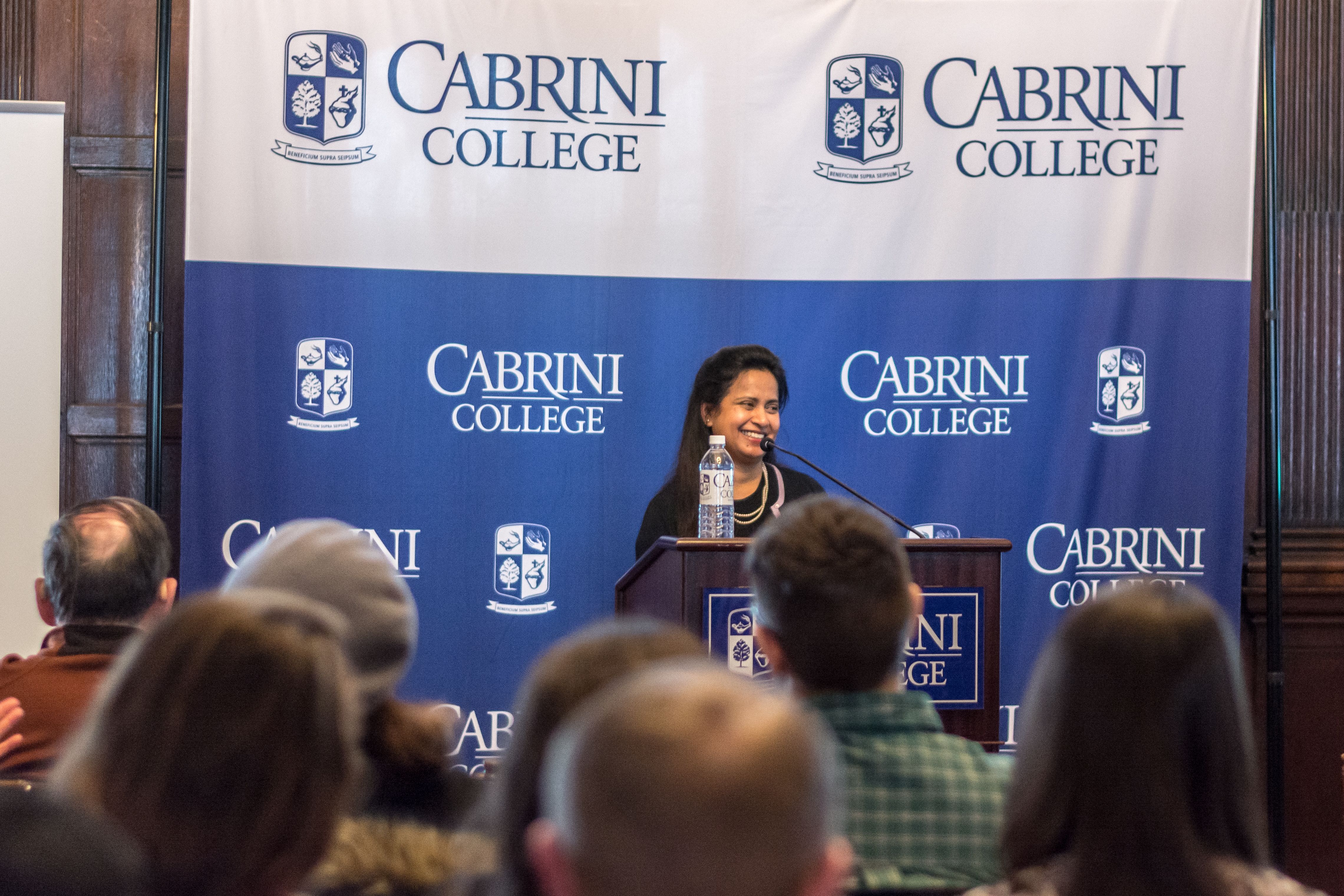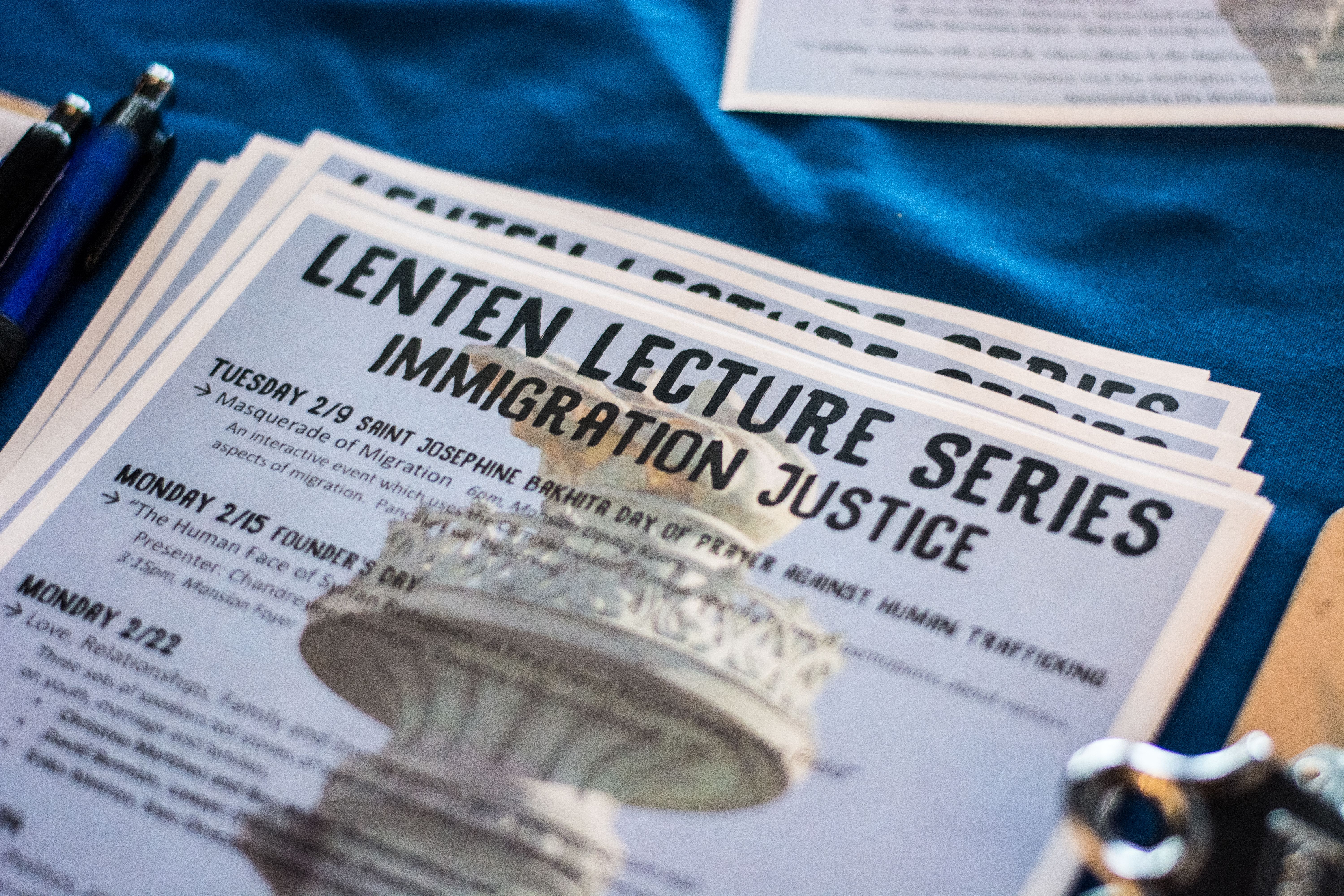
When one first encounters Chandreyee Banerjee, they meet a beautiful, smiling and petite woman. One would never guess that the soft spoken Banerjee would possess such an incredible amount of strength and power that she’s used to change lives for the better all over the world. She just returned from the Middle East where she directed all of CRS’s work in aid of Syrian refugees, which most say is the worst humanitarian disaster of our era.
Banerjee grew up in India where she obtained her master’s degree in rural development from Xavier Insti- tute of Social Services. In 1995, she started her journey with Catholic Relief Services where she built an incredible resume worthy of respect by many.
“In the 20 years I have been working for CRS, I have been focused on overseas programming, I have worked in pretty much every region of the world except Latin America,” Banerjee said. “It has included working in East Africa, South Africa, Middle East, South Asia, and Southeastern Asia some of the areas which are known for having the largest number of people under the poverty line.”
Banerjee’s most recent job took her to the Middle East where she and her team faced the Syrian Refugee Crisis head on.
Banerjee and her team worked in Turkey, which incidentally has received the largest population of Syrian refugees. Today, out of the 4.5 million people who have had to leave their country of Syria, over 2 million are currently located in Turkey.
“CRS focused on the needs of the refugees that were coming out of Syria completely confused and traumatized,” Banerjee said. “We tried to provide them the protection and the feeling that there is someone who cares. We also offered very tangible support in terms of food, shelter, clothing, medical support and most importantly care for the children.”
Banerjee’s team focused heavily on the well-being of the children they would encounter on an everyday basis. This included attention for the children, protection of children, trauma healing of children, psycho-social support of children and very importantly ensured that these children do not lose their future.
“Education is the building block to your future. You lose education, and your future is gone. Six months, a year without that opportunity you have lost your ability to redirect your life and create a life for yourself,” Banerjee said. “Education is something that is very important to CRS and we ensured in all of these countries that we have been working in that education facilities would be set up for children and that the certification process would be introduced.”
Many of the children Banerjee worked with will have the certification that will allow them to seamlessly return to their education system in Syria when the war is over.
According to Banerjee, many of the refugees feel like there will come a day when their country will be at peace and they will be able to go back to their homes where their grandparents and great grandparents lived.
However, the media and governments of certain powerful nations are making it very difficult for these refugees to find a safe haven and temporary home in host countries.
“I am just so passionate about this group of people, the Syrians,” Banerjee said. “What worries me and bothers me is what is being portrayed by the media now. The focus has gotten to talking about how much of a danger refugees are to these various powerful nations around the world and especially the United States.”
Ironically, many people that live in the United States today have ancestors that were immigrants themselves.
“This is the wonderful country that was formed mainly by refugees,” Banerjee said. “Most people’s ancestors in this country came when they were going through a similar crisis in their country. They were going through war and they came here to protect their families and they built a life for themselves. The Syrian refugees are no dif- ferent than you or I. The motivation to have a good life, to have safety, to create a future for their children is no different than what you or I hope for.”

Banerjee is very excited, however, about the recent work of young members of CRS as well as other youth that have become passionate about the crisis.
“When you are at the Hill when you are talking about the crisis, remember that they are humans. Your face is their face. This is the face where these doors are closing,” Banerjee said. “Put yourself in their shoes and think about how would you survive or cope if something like this happened to you. It’s very important for us to realize this and stand up for the rights of people that no longer have a voice. We need to be their voice.”
Banerjee also led Country Programs in Turkey and Lesotho, coordinated CRS and Caritas Internationalis’ humanitarian response in the Myanmar emergency, worked as Deputy Regional Director for the South East Asia Region (covering nine countries), managed a multi-Region, multi-Country Gates funded Agriculture initiative, coordinated all CRS programs in the South Asia region as well as worked on one of her biggest projects in leading the agency’s massive response to tsunami relief in 2004.
“I would wake up most days finding it hard to believe that we get paid for what we get to do,” Banerjee said. “You can imagine, going out to communities working with people, working with little children, and through the work of CRS, our partners, and communities, you make a little dent in their situation and you are able to be apart of the transformation in their lives, you are part of that smile that returns to their faces, and that in itself so rewarding.”
Much of Banerjee’s life has been dedicated to advocating and providing dignity to some of the world’s most vulnerable. Only a leader of such grace, determination, patience and passion could accomplish half as much as Banerjee has been able to do in her far-from-over 20-year career.
“The whole premise of my life focuses on the elimination of global poverty. Global poverty is a factor of economics plus several other influences. It is comprised of corrupt governments in countries, climate change, of how people view themselves and their future, it is a host of development issues. All of this creates global poverty. When thinking about global poverty removal, the expectation is that all of these different influences have been fixed,” Banerjee said.
Leave it to Banerjee to have her next statement leave every reporter in the room speechless and inspire every intention to leave the interview with a promise to change the world.
“A world without poverty would have honest governments, great policies, good division and distribution of resources. You would have everybody being able to access rights, everybody being responsible,” Banerjee said. “You’re talking about technology that would not erode the resources of the earth. You’re talking about all these issues working in tandom to remove global poverty. And that would be a perfect earth. You have arrived. You don’t need to do anything else except enjoy this wonderful, perfect opportunity.”


